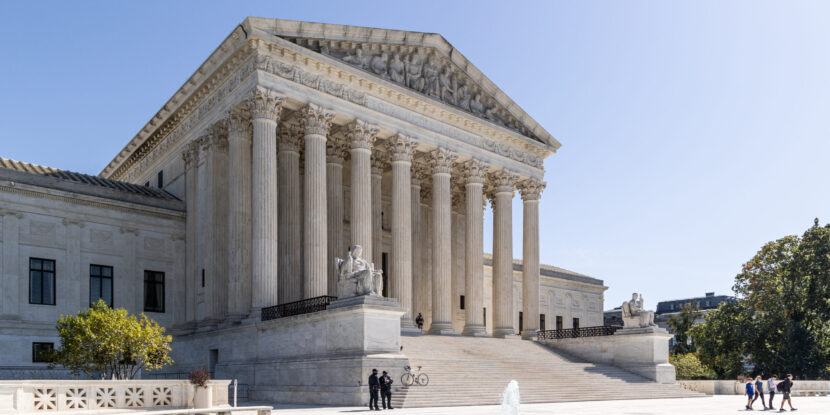
PULSE POINTS:
❓What Happened: The U.S. Supreme Court is deliberating if Medicaid recipients can file lawsuits to access specific healthcare providers, focusing on South Carolina’s decision to exclude abortion giant Planned Parenthood from Medicaid funding.
👥 Who’s Involved: The Supreme Court justices, Medicaid beneficiaries, Planned Parenthood, South Carolina government officials, and Julie Edwards, a plaintiff and Medicaid recipient.
Your free, daily feed from The National Pulse.
📍 Where & When: The case is being heard in Washington, D.C., with arguments presented on Wednesday. The decision is anticipated by the end of the Court’s term in June.
💬 Key Quote: “Congress specifically enacted this provision in response to some States’ efforts to restrict Medicaid patients’ choice of provider,” the plaintiffs stated.
⚠️ Impact: The outcome could impact Medicaid beneficiaries’ choice of healthcare providers and potentially reduce government funding sources for Planned Parenthood.
IN FULL:
The U.S. Supreme Court is set to decide whether Medicaid beneficiaries can legally challenge South Carolina’s exclusion of Planned Parenthood from its state Medicaid program over the vast number of abortions it carries out. This case will test whether states truly have the right to adopt pro-life stances.
South Carolina, led by Republican Governor Henry McMaster, cut Planned Parenthood from receiving Medicaid payments in 2018, though these did not cover abortion services. State officials argue this move complies with federal prohibitions on government funding for abortion services. They claim that allocating Medicaid funds to Planned Parenthood amounts to indirectly subsidizing abortions.
Julie Edwards, a Medicaid recipient, initiated legal action against South Carolina. She claimed that disallowing Planned Parenthood from the Medicaid program infringes on the Medicaid Act. “Congress specifically enacted this provision in response to some States’ efforts to restrict Medicaid patients’ choice of provider,” the plaintiffs said.
Typically, Planned Parenthood receives a significant portion of its funding through government grants, contracts, and Medicaid reimbursements. State representatives argue that Medicaid recipients have alternative healthcare options.
Should the court rule in favor of Edwards and Planned Parenthood, the lawsuit against the state’s funding exclusion would proceed. Conversely, a decision in favor of South Carolina could strengthen similar exclusion efforts in other states. The judgment is expected to be delivered by the end of the Supreme Court’s term in June.
While Planned Parenthood claims it does more than abort babies, the organization has been accused of heinous actions in the past involving abortions. Last year, the Missouri Attorney General sued the group for trafficking minors for abortions without their parents’s consent. In another case, documents claimed that the University of California-San Diego was even buying the body parts of aborted babies from the group.

PULSE POINTS:
❓What Happened: Special elections are being held in two Florida congressional districts that were previously considered safe for Republicans, with increased attention after President Donald J. Trump removed Rep. Elise Stefanik (R-NY) from consideration for U.N. ambassador over concerns the House Republican majority could be in jeopardy.
👥 Who’s Involved: Democratic candidate Josh Weil, Republican state Sen. Randy Fine, Republican Jimmy Patronis, Democrat Gay Valimont, former Rep. Mike Waltz (R-FL), former Rep. Matt Gaetz (R-FL), President Trump, and House Minority Leader Hakeem Jeffries.
Your free, daily feed from The National Pulse.
📍 Where & When: Special elections in Florida’s 6th and 1st Congressional Districts, with voting on Tuesday, April 1.
💬 Key Quote: President Trump stated, “We don’t want to take any chances… It’s basic politics.”
⚠️ Impact: These contests are drawing significant attention due to unexpected competitiveness and are seen as a litmus test for GOP strength, potentially affecting legislative support for Trump’s agenda.
IN FULL:
Two critical special elections in Florida are underway as voters head to the polls on Tuesday. The two high-profile races for the House of Representatives could significantly impact the Republican majority in Congress and whether the party continues to control the lower legislative chamber in the coming months.
Last week, President Donald J. Trump moved to withdraw Rep. Elise Stefanik’s (R-NY) nomination for U.N Ambassador as a Republican loss in either of the Florida races today could reduce the GOP majority to just a three-seat margin. Republicans currently hold a five-seat edge over the Democrats. However, there are four vacant House seats, with two of the vacancies being in deep blue Democrat districts.
The move to withdraw Stefanik’s appointment signals Trump’s intent to prevent further weakening of the House majority. Trump commented, “We don’t want to take any chances… It’s basic politics.”
In the 6th District, which spans Florida’s Eastern Coast, Democrat Josh Weil is facing off against Republican state Sen. Randy Fine. The district was previously held by Mike Waltz, who vacated his seat for a role as Trump’s national security advisor. Notably, Weil, a teacher, has gathered over $9 million in campaign funds by mid-March, significantly overshadowing Fine’s less than $1 million, as per Federal Election Commission data. Retaining this seat is considered absolutely crucial to the GOP majority’s continued control of the House.
Meanwhile, the 1st District in the Panhandle pits Republican Jimmy Patronis, Florida’s chief financial officer, against Democrat Gay Valimont, an ardent gun control advocate. This race replaces former Rep. Matt Gaetz (R-FL), who resigned following House Ethics Committee allegations hindering his nomination for attorney general. Valimont’s campaign raised nearly $6.5 million compared to Patronis’ $2.1 million by mid-March.
These elections, alongside a Wisconsin Supreme Court race, are the first since Trump resumed office, offering insights into the GOP’s standing. Additionally, Wisconsin Democrats hope that control of the state’s Supreme Court can clear the way for mid-decade redistricting, with Republicans likely to lose a Congressional seat in the state under a new district map.
Despite enthusiasm among Democratic Party activists, House Minority Leader Hakeem Jeffries (D-NY) has stopped short of guaranteeing any pickups for his party this evening. “What I can say, almost guarantee, is that the Democratic candidate in both of these Florida special elections will significantly over-perform, which will represent another sign that the Republicans are on the run and that Democrats are going to take back control of the House of Representatives next year,” Jeffries said on Tuesday.
show less

 2 months ago
9
2 months ago
9








 English (US) ·
English (US) ·